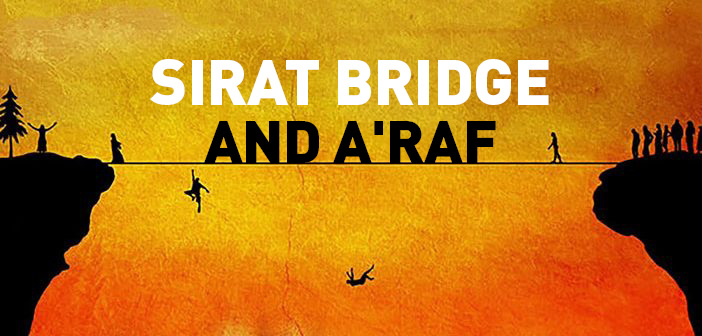What is the sirat bridge in islam? What does sirat mean in islam?
SIRAT BRIDGE
It is a path or bridge stretched over hell. Everyone will pass over it. Some believers will pass over it faster and some others slower, depending on the state of their deeds in the world, while the people of disbelief and sinners will not be able to pass over it and fall into Hell by faltering. In one of the hadiths, the Prophet (saw) stated that he and his followers would be the first to pass the sirat that will be built over Hell and that people could pass over it quickly and easily due to their good deeds.[1]
A’RAF
Aʿrāf, which literally means the high parts of the mountain and the hill, is the name of the wall and the high part between heaven and hell. There are two views about Aʿrāf and who will be at A’rāf:
- Those who die without hearing the message of any prophet, and the children of the polytheists who die when they are young will be at Aʿrāf.
- The ones who will be at Aʿrāf are believers whose good and bad deeds are equal. Before they enter Paradise, they will be kept in this place for a while, and by the grace of Allah Almighty, they will then enter Paradise.
The following is stated about Aʿrāf, which is also the name of a chapter in the Qur’an, “Between them shall be a veil, and on the heights will be men who would know every one by his marks: they will call out to the Companions of the Garden, ‘peace on you’ they will not have entered, but they will have an assurance (thereof). When their eyes shall be turned towards the Companions of the Fire, they will say: ‘Our Lord! send us not to the company of the wrong-doers.’”[2]
[1] Al-Bukhari, Adhān, 129, Riqāq, 48-52; Muslim, Imān, 81; Ibn Maja, Zuhd, 33.
[2] Al-Aʿrāf, 7: 46-47.
Source: Basic Islamic Principles (ʿilmi ḥāl) According to the Four Sunni Schools With Evidence From The Sources of Islamic Law, Prof. Hamdi Döndüren, Erkam Publications



